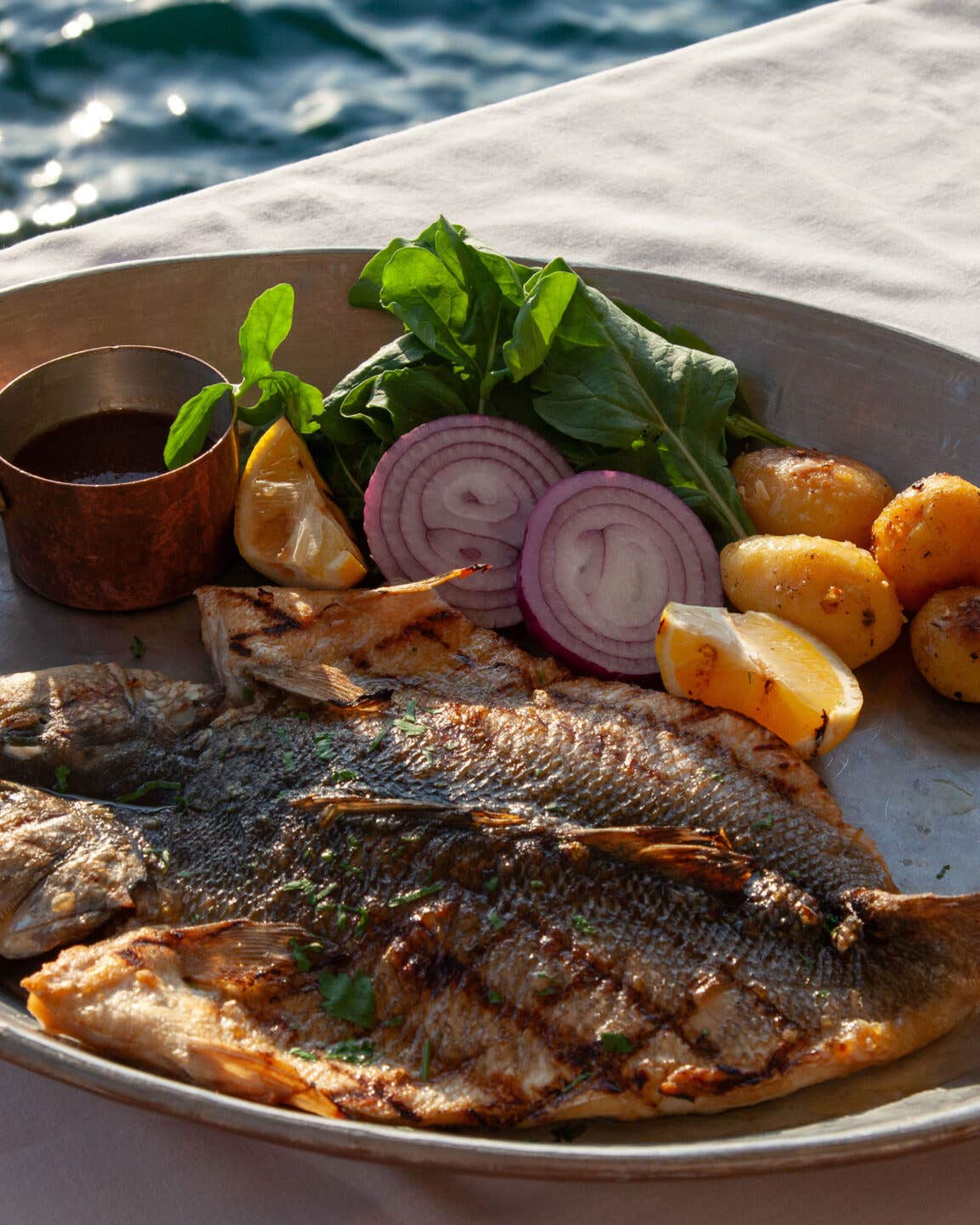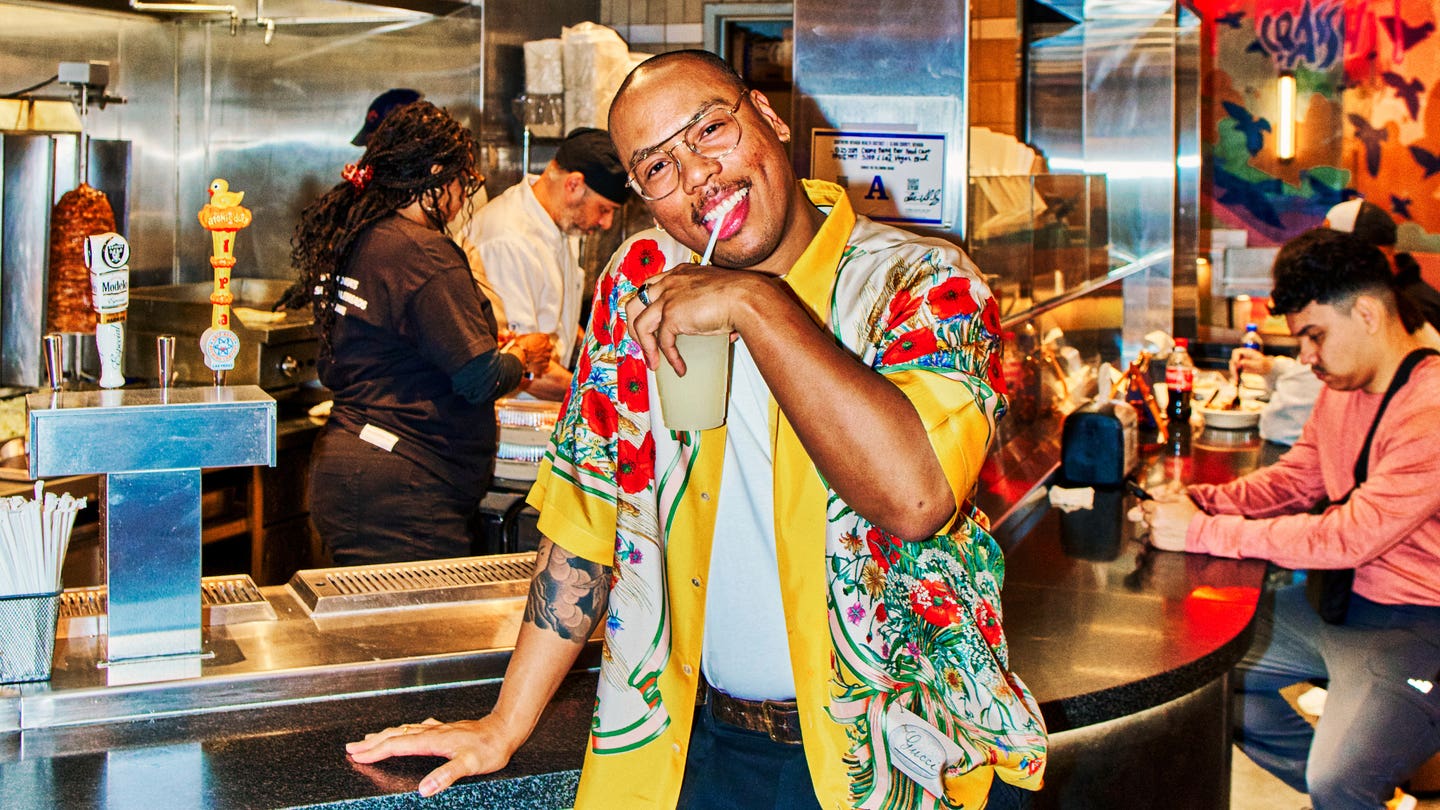
Jerusalem Mix
As shoppers buy provisions for Shabbat dinner on a Friday morning, Mahane Yehuda—West Jerusalem's main shuk, or market, and the largest one in Israel—is bustling. Workers at a bakery off Jaffa Road unload big trays of rugelach from oversize ovens. In a slate-paved alley sheltered by a glass roof, the proprietor of a dry goods shop weighs out pistachios, dried chickpeas, and spice mixtures specially blended for rice pilafs and soups. A blood-spattered butcher hacks at a side of beef, and a fishmonger wrestles a live carp. Bearded Hasidic men in fur-lined coats and big black hats mill around young Palestinian vendors hawking vegetables brought past checkpoints from the West Bank.
Crowds of shoppers huddle around pillars of halvah, towering stacks of fresh pita, and mountains of produce: tomatoes, miniature cucumbers, raw olives and dates, eggplants, pomegranates, kohlrabi, mangoes grown in thickets reclaimed from the desert, and on and on. Here, in a city riven by centuries of religious conflict and shadowed by the modern threat of terrorism, I watch as Jews, Muslims, and Christians converge on this place, coming together as a matter of daily routine around the buying, selling, and consuming of food. The abundance of raw ingredients aside, it is the last activity that has brought me here.
A nosher's paradise lies in and around the market, a compact warren of shop-lined streets and covered alleyways stretching just a few city blocks northwest of Jerusalem's walled old city. Dozens of hole-in-the-wall lunch counters and family-owned restaurants here offer classic Israeli dishes sourced in the shuk. While the smaller markets in the old city's divided districts have a more segregated ethnic focus, the food at Mahane Yehuda (the name literally means Judah's Camp) more broadly reflects Israel's diverse national cuisine. You'll find cooking styles drawn not only from the vast Jewish Diaspora (both the Sephardim, with their Turkish, Moroccan, Yemenite, and Persian roots, and the Ashkenazim, with their origins in Eastern Europe and Russia) but also from the neighboring Palestinian territories and beyond. All those streams converge at the shuk, where cooks use both imported foods and local ingredients: dates from the palm groves of the Negev Desert, lemons and oranges from the citrus orchards in Galilee, meat and produce from the vast cooperative farms of the Jordan Valley.
The sort of polyglot food found at the market has, in turn, become one of Israel's most successful cultural exports. My last visit to Israel was 25 years ago, on a family vacation, but I've been savoring the country's cooking for years in and around my home in New York City: the shawarma spot in the West Village that used to show Israeli soccer games on a back-room TV, the hummus parlor packed with homesick Israelis, the falafel joint run by a transplanted Tel Aviv chef. Entering Mahane Yehuda on this return trip, I feel the curtains parting to reveal the birthplace of many dishes I've come to love. Much is familiar, but there is also plenty new to discover: brighter flavors, fresher ingredients, and what I can only describe as a taste of place.
Established as a loose cluster of vendor stalls by Arabs and Sephardic Jews in the late 19th century—and as well preserved in its own way as the old city's biblical-era ramparts just down the hill—the market is a portal to the past in a country increasingly swept up by modernity. Today, the shuk is as busy as it's ever been in its hundred-plus-year history; that marks a dramatic improvement over the late 1990s, when a string of bombings, combined with shifting shopping habits, drove many patrons to new indoor malls and wide-aisled supermarkets.
The shuk has rebounded with the help of entrepreneurs like Eli Mizrachi, who until recently was the chairman of the market's merchant association and remains its semi-official mayor. He also owns Cafe Mizrachi, an establishment comprising a dozen or so tables spilling out into a covered corridor near the market's entrance; in the seven years it's been open, the cafe has become the market's social hub. I start my first day at the shuk there, with a cup of strong coffee and sabich, a breakfast pita sandwich of eggplant, hard-boiled egg, tahini (the ubiquitous sesame paste), parsley, and cucumber salad. Mizrachi, a scrappy 58-year-old, tells me he'd always dreamed of opening a cafe. "The market was in very bad shape economically," he says. "Somebody needed to do something to bring in more people." Opening the cafe was his way of accomplishing that. It doesn't hurt that the place is staffed largely by young women, including Mizrachi's two striking daughters.
Some of the best market eateries are located in the narrow streets just outside the shuk's official boundaries. After leaving Cafe Mizrachi and wandering among the stalls for a while, I exit the market's gates onto Agrippas Street; walk past a bakery, a kosher pizzeria, and a slim alcove where an elderly blacksmith is sharpening scissors in a shower of sparks; and arrive at Mordoch, a 25-year-old restaurant that specializes in good, simple home cooking served fast and cheaply. Approaching a counter that offers a view into a small kitchen, beneath a poster that depicts Hollywood stars standing in for the Apostles at the Last Supper, I order what everyone's eating: soup containing what appear to be flattened matzo balls. They turn out to be a Kurdish version of kubbe, the meat-stuffed semolina and bulgur dumplings found in various forms throughout the Middle East and also known as kibbeh. Mordoch's dumplings, boiled in a beet or lemony zucchini-based soup and also deep-fried on their own, are dense and satisfying.
Mordoch is multiethnic Israel writ small. The chef-owner, Itzhak Agay, who is working the counter when I visit, says he can trace his roots on his father's side to Iran and Iraq, while his mother's family—originally from Spain—goes back ten generations in Jerusalem. The restaurant serves family specialties and whatever regional dishes the clientele has requested over the years. "We started out making rice, meatballs," he says; "then people came in saying, 'Hey why don't you serve mejadra?'" He's referring to a fried-onion-topped rice and lentil side dish believed to have its origins in biblical times. "A week later another one comes: 'Hey, mister, do you do kubbe?' Okay, which kubbe do you want?"
Even the smallest restaurants usually offer eclectic menus. For a late breakfast the next day, I visit Azura, the market's oldest and best-known hole-in-the-wall eatery; the place serves food to please every ethnic contingent, from stewed Turkish eggplant to Ashkenazi-style dishes like stuffed cabbage, stewed beef lungs, and goulash. As he has for the past 40 years, Azura's owner, a man in his 70s named Ezra Shraflar, began cooking this morning at four o'clock, setting the daily specials to simmer on a worn set of kerosene stoves. I try the silky hummus, said to be the best in the market, and the shakshuka, a dish of Libyan origin that consists of eggs cracked into a spicy stew of tomatoes, onions, and chiles.
There are miniature refueling spots like Azura throughout the shuk, some so small you can walk right past them without noticing. One of the tiniest I manage to find is a kebab joint run by a 54-year-old Moroccan-born cook named Morris Bitton. The diminutive spot, with just a handful of tables, stands right next door to the butcher shop that supplies Bitton's meat. Instead of presenting me with a menu, Bitton just opens the door of his fridge and points to what's inside. "We have kebab," he says, "chicken, fish, goose liver, goose breast, three kinds of beef kebab." He tells me that he also serves delicious sweetbreads; I order some. The tender, smoky pieces of beef offal come on long metal skewers and have been delicately blackened over Bitton's small charcoal grill.
At Mahane Yehuda I find myself pausing for half a dozen snacks in the course of a single afternoon; that's the type of on-the-go eating to which the_ shuk_ is ideally suited. Near its entrance, alongside a gate guarded by baby-faced Israeli army soldiers, I find the Levy falafel stand. That deep-fried snack of mashed, parsley-flecked chickpeas served in a pita is perhaps Israel's best-known food. I'd seen it being served at a few shops in and around the market but had been told by Jerusalem friends that Levy's was the only place to get decent falafel in Mahane Yehuda.
The Levy brothers have been fixtures in the market for as long as anyone can remember—supporting, it is said, five families on chickpeas and pita. As I approach the order window, three of the brothers, now in their 70s, are feverishly attending to hungry shoppers. One of them fries eggplant, a customary falafel sandwich accompaniment, and restocks condiments, while another fishes golden falafel balls from the fryer. The third assembles sandwiches so fast—hummus, spicy green schug (an herb-infused hot sauce), pickles, falafel, chopped salad, a dollop of tahini—that his weathered hands are practically a blur. It is some of the best falafel I've ever had.
The Levy stand, like most businesses in the market, shuts down by sunset, after which Mahane Yehuda becomes a near-ghost town. Among the few flickers of nocturnal life is a string of night-owl businesses along Agrippas Street, just outside the market. Each of them—Sima, Sami, and the Steakiyat Hatzot—claims to have invented the late-night snack known from Brooklyn to Haifa as Jerusalem mixed grill: a savory combination of quick-griddled diced chicken, onions, and spices.
One night, after listening to live jazz outside Cafe Mizrachi, which also stays open late, I head to Steakiyat Hatzot. At the take-out window, I'm served by a young man in a crewcut and T-shirt named Joseph Ajami, who tells me that his father and uncle, who founded the place—Jerusalem's first late-night restaurant—in 1970, are the true inventors of Jerusalem mixed grill. "We have a unique formula, with 22 spices," he says. "Everyone wants us to sell it to them." The walls of the spare dining room—fragrant with turmeric, cumin, and the other, mystery spices—are decorated with framed photographs of Israeli politicians, sports stars, and entertainers.
The mixed grill itself—stuffed into a pita with a cured-mango relish called amba and served with house-cured pickles and olives—is fatty, salty, piquant bliss. It brings pure comfort after a long day in the shuk.
Keep Reading
Continue to Next Story










